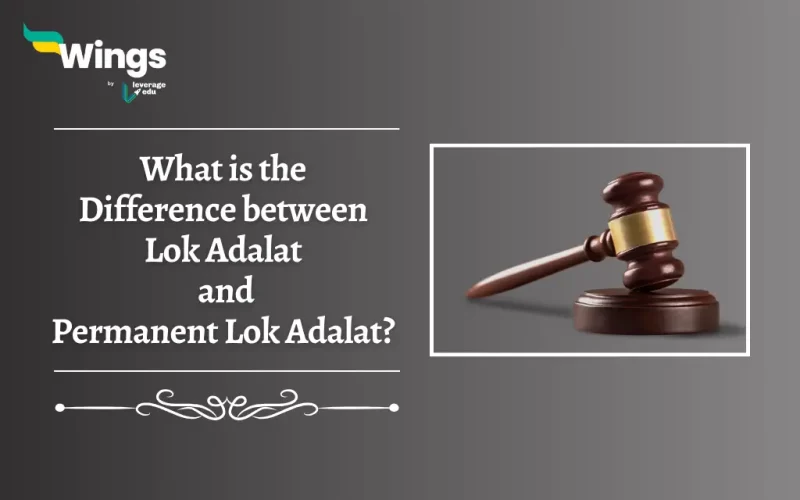The Lok Adalat is a platform where cases or disputes, whether pending in a Court or at the pre-litigation stage, are resolved through amicable compromises. In contrast, the Legal Services Authorities Act of 1987 was amended in the year 2002, hence paving the way for the establishment of Permanent Lok Adalats (PLA) tasked with addressing matters related to public utility services. Furthermore, both the Adalats are Alternative Dispute Resolution (ADR) mechanisms that aim to resolve disputes outside of court. Read on to learn in detail about the Difference between Lok Adalat and Permanent Lok Adalat in India.
Difference between Lok Adalat and Permanent Lok Adalat
Table of Contents [show]
Furthermore, here is a tabular difference between both the Adalats:
| Difference between Lok Adalat and Permanent Lok Adalat in India | ||
| Feature | Lok Adalat | Permanent Lok Adalat |
| Nature | Temporary. | Permanent. |
| Jurisdiction | Cases pending in Courts or pre-litigation disputes. | Public Utility Services only. |
| Cases Handled | Handles all types of cases including civil, criminal, and compoundable cases. | Primarily handles disputes related to public utility services such as transport, postal, and telegraph services, insurance, and supply of power, water, and sanitation. |
| Procedure | Less formal and flexible. | May have more structured procedures. |
| Decision Making | Through persuasion and conciliation. | Can pass binding awards if settlement is not reached. |
| Monetary Limit | No specific limit. | Up to Rs. 1 Crore (previously Rs. 10 Lakhs). |
| Composition | Comprises of serving or retired judicial officers, lawyers, and social workers as members. | Comprises of a chairman, who is a retired judicial officer, and two other members, one of whom is from the administrative field, and another from the legal profession. |
Important Points to Remember
Here are some important points to remember about the difference between Lok Adalat and PLA:
- Lok Adalat is more widely used for various types of cases, while PLA is specific to public utility services.
- Participation in Lok Adalat is voluntary, while PLA can be mandatory for certain categories of disputes related to public utilities.
- Lok Adalat focuses on settling through persuasion, while PLA can issue binding awards if no settlement is reached.
Related Blogs
Lastly, we hope you liked our blog and gained an understanding of the Difference between Lok Adalat and Permanent Lok Adalat. Moreover, you may even read more blogs and empower yourself with knowledge regarding Civics and Polity!
 One app for all your study abroad needs
One app for all your study abroad needs















 45,000+ students trusted us with their dreams. Take the first step today!
45,000+ students trusted us with their dreams. Take the first step today!
